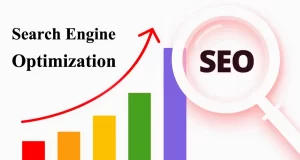The marketing industry has significantly changed in the current digital era. Traditional means of advertising and promotion have been replaced by digital marketing, a strategy that is more focused and measurable. However, what precisely is digital marketing and how does it operate? In this thorough guide, we’ll delve into the complexities of digital marketing while examining its numerous elements, tactics, and advantages. Buckle up as we travel on an exciting adventure through the world of digital marketing!
What is digital marketing?
Digital marketing is the use of digital technology and platforms to advertise goods, services, or brands to a specific target market. It entails using a variety of online platforms, including websites, social media, email, and search engines, to communicate with potential customers and encourage desired behaviour. Digital marketing, as opposed to traditional marketing strategies, enables companies to target precise demographics, reach a worldwide audience, and track the success of their marketing campaigns in real time.
Search engine optimisation (SEO), pay-per-click (PPC), social media marketing, content marketing, email marketing, and other strategies are all included in the broad category of digital marketing. Businesses may effectively improve their online presence, raise brand awareness, produce qualified leads, and eventually increase conversions and income by utilising these tactics.
How Does Digital Marketing Work?
In order to attract, engage, and convert potential customers, digital marketing relies on the concept of building a cohesive and integrated online presence. In order to offer a consistent brand message across many touchpoints, it requires a planned blending of different channels, platforms, and methodologies.
Businesses often take a step-by-step method to begin using digital marketing:
Define Goals
Setting particular goals and objectives that are in line with the overarching corporate objectives is the first stage. These objectives might include raising website traffic, enhancing brand recognition, producing leads, or raising online sales.
Identify Target Audience
Identification of the target market and the development of thorough buyer personas are essential. This aids in customising marketing initiatives to connect with the target demographic and increase return on investment (ROI).
Select Appropriate Channels
Businesses choose the most appropriate digital marketing channels to reach their target audience successfully based on their target demographic and aims. Search engines, social media websites, email providers, and other services may fall under this category.
Execute and Optimize
Once the strategy is in place, the campaigns should be put into action throughout the selected channels. In order to guarantee the campaigns’ optimum efficiency and efficacy, ongoing monitoring and optimisation are crucial. When determining where the marketing activities need to be improved upon, data analytics and performance indicators are quite important.
Measure Results and Refine
Businesses can effectively monitor the performance of their initiatives thanks to digital marketing. To evaluate the success of the marketing initiatives, key performance indicators (KPIs) such website traffic, conversion rates, click-through rates, and engagement metrics are examined. These insights are used to adjust the plan and optimise it in order to provide better outcomes.
The Components of Digital Marketing
Digital marketing is made up of a number of parts, each of which is essential to attaining particular marketing objectives. Let’s focus on a few of the essential elements:
Search Engine Optimization (SEO)

SEO, or search engine optimisation, is the process of optimising a website to increase its exposure and rating on search engine results pages (SERPs). To improve organic (non-paid) search engine visibility, it uses both on-page and off-page optimisation strategies. By ranking higher in the search results for pertinent keywords, SEO aims to bring targeted traffic to a website.
Some important aspects of SEO include:
- Keyword Research
- On-Page Optimization
- Off-Page Optimization
- Content Creation
Pay-Per-Click Advertising (PPC)

Pay-Per-Click (PPC) advertising is a form of sponsored promotion in which businesses are charged a fee each time one of their ads is clicked. PPC campaigns allow businesses to display their advertising to a highly focused audience because they are typically done through search engines or social media platforms.
Key elements of PPC advertising include:
- Keyword Research
- Ad Creation
- Bid Management
- Performance Tracking
Social Media Marketing

Social media marketing is interacting with the public on social media platforms to promote a brand and boost website traffic or conversion rates. Due to the countless individuals who use websites like Facebook, Instagram, Twitter, and LinkedIn, social media marketing offers organisations tremendous opportunity to individually engage with their target audience.
Some important aspects of social media marketing include:
- Platform Selection
- Content Creation
- Community Engagement
- Paid Advertising
Content Marketing

The main goal of content marketing is to draw in and hold on to a clearly defined audience by producing and distributing valuable, pertinent, and consistent information. It is a calculated strategy that seeks to benefit potential clients while subtly advancing a company or item.
Key elements of content marketing include:
- Content Strategy
- Content Creation
- Content Distribution
- Measurement and Optimization
Email Marketing

Email marketing is the practise of using email as a communication tool to send tailored messages to a particular audience. It is a very successful and economical marketing tactic that enables companies to speak directly to potential clients and maintain ties with current ones.
Key aspects of email marketing include:
- Email List Building
- Segmentation and Personalization
- Automation
- Testing and Optimization
Final Thoughts
Digital marketing has completely changed how companies interact with their target market and advertise their goods or services. It includes a broad range of tactics and platforms that make use of the internet’s potential to promote brands, interact with consumers, and accomplish marketing objectives.

























+ There are no comments
Add yours